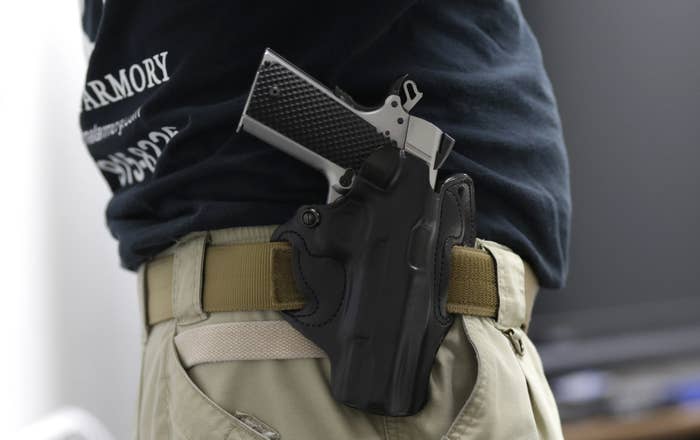
Florida failed to do national background checks for people who applied for concealed weapons permits for a full year, meaning hundreds, if not thousands, of people who would have been disqualified may have been approved to carry guns.
The reason: The lone employee in charge of running names through the FBI database wasn't able to log in for over a year, a state report found. During that time, anyone with a criminal record or who had been banned from possessing a firearm because of a mental health issue could have slipped through the system.
The lapse, which was detailed in a Florida Office of Inspector General report from June 2017, was first reported Friday by the Tampa Bay Times after obtaining the report through a public records request.
The Florida Department of Agriculture and Consumer Services, which issues concealed weapons permits, stopped running the names of applicants through the FBI's National Instant Criminal Background Check System in February 2016, yet continued to approve hundreds of thousands of applications for concealed weapons permits, according to the report.
Criminal background checks were done on all applications, officials told BuzzFeed News, but the national database would have assured the applicant had no criminal record or other disqualifying red flags in other states.
The lone employee responsible for running the names through the system at the time, Lisa Wilde, told investigators that she had a "login issue and they were unable to access the database."
Another employee, who acted as her backup when she was not in the office, also couldn't log into the system, but Wilde told investigators she "never followed up to resolve the issue."
Wilde was terminated after the mistake was found.
The National Instant Criminal Background Check System, which is run by the FBI, flags people who are buying firearms or applying for a criminal background check if they have a criminal record or have been banned from possessing a firearm because of a mental health issue.
After the error was discovered, the Florida Department of Agriculture reviewed 365 applications that should have been, but weren't, run through the national database, Commissioner Adam Putnam told BuzzFeed News in a statement.
That review resulted in 291 applications that were revoked, he said.

The lapse occurred as Putnam has tried to streamline and speed up the system for concealed weapons permits.
As part of his campaign to be Florida's governor, Putnam has touted his policies to expand concealed weapon permits in the state. He blamed the lapse on a "deceitful and negligent" former employee.
"We immediately launched an investigation and implemented safeguards to ensure this never happens again," Putnam told BuzzFeed News.
The liberal media recently called me a sellout to the NRA. I'm a proud #NRASellout! Sign below if you are, too. https://t.co/Uro4UVtIOf
According to the report, Wilde and her backup stopped using the system from Feb. 26, 2016, until late March 2017, when the issue was finally discovered.
Despite this, the agency continued to receive and process more than 274,000 applications for concealed weapon permits from July 2016 to June 2017, approving the vast majority of them without having conducted the background check.
"I dropped the ball — I know I did that," Wilde told investigators, according to the report. "I should have been doing it and I didn't."
According to the state's annual report on concealed weapons permits, only 6,470 of the 274,000 applications that were submitted were denied. Of those denials, nearly half of them were denied for an incomplete application; the rest were denied because the applicant was found ineligible.
According to the 2017 report, the problem was only discovered when the chief of the state's Bureau of License Issuance noticed that her office had not received any correspondence from people trying to find out why their application had been denied.
That prompted another state employee to notice that the Bureau of Licensing and Support Services had not received any reports from the National Instant Criminal Background Check System.
The Office of Inspector General found that Wilde had been negligent and recommended that the agency find any applications that were previously approved, but that should have been rejected due to the national background check.
In a statement to the Tampa Bay Times, a spokesperson for the Department of Agriculture and Consumer Services said Wilde was immediately terminated after the lapse was discovered.
"The integrity of our department's licensing program is our highest priority," the spokesperson told the paper.
